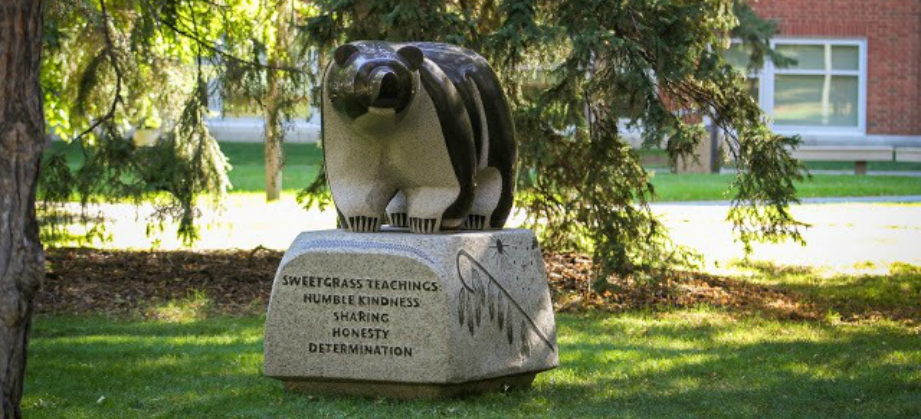Indigenous Initiatives Resources

Sweetgrass Bear — The University of Alberta was honoured to acquire The Sweetgrass Bear, a sculpture by Indigenous artist Stewart Steinhauer. The sculpture acknowledges the University's location on Treaty 6 territory and is part of our efforts to work toward respectful, meaningful reconciliation with Indigenous peoples. The Sweetgrass Bear stands at the south end of Quad, in front of the Administration Building.
Monthly Vodcast: Presenting Our Presence!
Presenting Our Presence (POP), is a monthly vodcast with a focus on amplifying the voices and visibility of Indigenous knowledge holders who enliven the U of A community. You can learn more about the vodcast in this Quad article.
Episodes can be found on the Presenting Our Presence YouTube Channel.
The Indigenous Initiatives Portfolio works collaboratively with stakeholders inside the University and within the broader community to ensure that Indigenous initiatives support the strategic direction of the University and enhance relationships and opportunities for collaboration. A number of initiatives, such as the following, have taken place or are underway.
Territorial Acknowledgement
Three options for Territorial Acknowledgements were developed through an internal consultation process at the University of Alberta for use in written publications including the institutional strategic plan, For the Public Good, as well as Convocation Programs. This is recognized as only a small first step and there is more work to be done regarding territorial acknowledgement. With permission from the author (a new hire and graduate student we are proud to have here at the University of Alberta) Chelsea Vowel, we encourage those interested in learning more about the context for territorial acknowledgments to check out this blog post from September 2016: Beyond Territorial Acknowledgements.
Decolonizing Approaches to Research at uAlberta (DARA)
The story-based, multi-method DARA project explored the experiences and perspectives of researchers at the University of Alberta who understand their work as decolonizing. Recognizing the ongoing disconnect between institutional rhetoric and the lived experiences of researchers, the DARA project gathered the insights of 33 researchers (one-third of whom were Indigenous) across 12 faculties. The report focuses on their understandings of what ‘decolonization’ is and is not, their journeys to practicing decolonial and Indigenous scholarship, the challenges and joys of doing so, and changes needed to more fully support this work. We see the recommendations outlined in this report as central to the creation of a decolonized research institution. Read the report.
Indigenizing Curriculum
In what ways might the university community begin to Indigenize curriculum? Or, in what ways might the university community begin to engage with Indigenous perspectives and worldviews across our curricula and programs? See Google Drive for resources to begin these conversations.
Indigenous Hub
This site was developed as part of an inventory of existing Aboriginal initiatives that were undertaken by the Office of the Provost and Vice-President (Academic) in 2015. This site provides an index of all of the existing Indigenous/Aboriginal programs, services, and initiatives across the University of Alberta and can be found here.
2nd Annual Forum on Reconciliation - Learning to 'Walk the Talk'
The University of Alberta was honoured to host the 2nd Annual "Building Reconciliation Forum: Universities Responding to the TRC's Calls to Action"-a two-day leadership forum for Canadian university presidents and their leadership teams, First Nations, Métis and Inuit leaders, student leaders, Indigenous scholars, and scholars dedicated to research that is meaningful to Indigenous peoples. The 2nd Annual Building Reconciliation Forum was held at the University of Alberta, North Campus from September 28-29, 2016.
